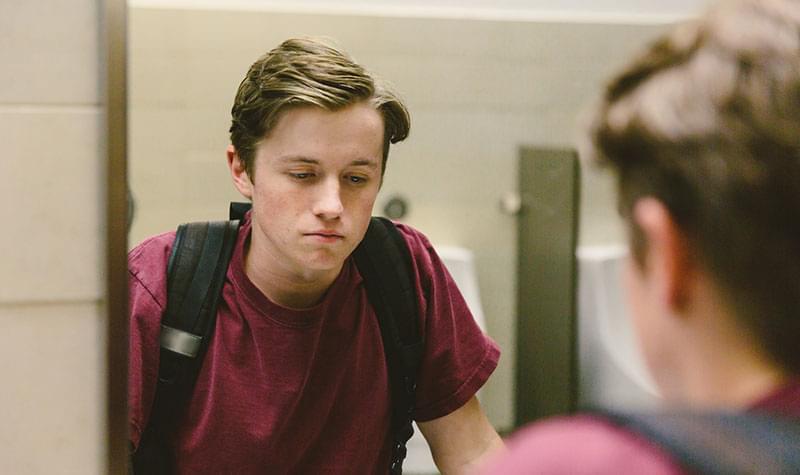
Bipolar disorder in teens is often misdiagnosed.
Since teens' first symptoms are often the same as someone suffering from unipolar depression, they are often mislabeled as depressed or suffering from anxiety.
Many children suffering from Attention Deficit Hyperactivity Disorder (ADHD) are also misdiagnosed as bipolar, and vice versa — adding to the difficulty of getting early treatment.
In addition, the hormonal fluctuations that often accompany adolescence can cause a pattern of behavior that's similar in nature to bipolar disorder.
A hormonal teen can experience mood highs and lows, sometimes within a very short period of time, which can confuse the diagnosis further.

Symptoms of Bipolar Disorder in Teens
To understand the difference between bipolar disorder, mood swings, and other mental health issues, you need to understand how bipolar disorder typically presents.
Bipolar disorder is characterized by both manic and depressive episodes. A teen that's experiencing mania may:
- Be euphoric or act immature for their age
- Have a short temper
- Speak quickly and subject-hop
- Have insomnia, but still feel energized
- Have trouble focusing on tasks
- Be more than usually interested in sex or sexual talk
- Participate in high-risk activities
A teen that's experiencing a depressive episode may:
- Have feelings of extreme sadness
- Have frequent head and stomach aches and/or chronic pain
- Sleep a lot, or not at all
- Struggle with feelings of worthlessness
- Overeat or under-eat
- Exhibit listlessness and inability to have fun
- Have suicidal thoughts

Is It Teenage Mood Swings or Bipolar?
As your read through the symptoms, you might be thinking: "Don't all teens exhibit those symptoms sometimes?"
The short answer is "yes."
But there are significant differences that a mental health professional will look for to determine whether you're dealing with teenage bipolar symptoms or one of the other issues misdiagnosed as bipolar disorder.
Typically, a person displaying symptoms of bipolar disorder will:
- Have a history of episodic mood swings
- Be more likely to be withdrawn and sleep more, rather than less
- Be less likely to exhibit agitation and weight loss
- Be relatively young at onset
- More commonly exhibit atypical symptoms of depression
- Have a family history of bipolar disorder
- Have brief, but numerous episodes
- Not respond well to antidepressant therapy
- Have a tendency toward psychotic behavior
- Have a seasonal pattern to their moods
- Be more likely to abuse substances or attempt suicide
As you can see, the differences are subtle — but real.
That's why it's critical to keep an eye on your teen's symptoms, even keeping a diary of moods and episodes if possible. That way your doctor will have the most information possible to make a clear and correct diagnosis.

Treatments for Bipolar Disorder in Teens
If you think you might have a teen with bipolar disorder, don't panic. Once you have a diagnosis by a mental health professional, you'll have access to many treatment options.
Therapy
Therapy can be an important part of your teen's treatment plan. A therapist will help your child deal with their feelings about their diagnosis.
They'll also work on getting your teen to express their feelings, improve their relationships with family and friends, and manage their symptoms when they're in the middle of an episode.
- Psychotherapy, or talk therapy, is helpful in managing the stress that comes along with having bipolar disorder. Therapy sessions can be one-on-one with a therapist, or in a group setting with other teens that are dealing with similar issues.
- Cognitive behavior therapy is a great way to help your bipolar teen develop problem-solving skills that can help derail negative behaviors and substitute positive ones.
- Interpersonal and social rhythm therapy can improve family dynamics and develop ways to avoid disruptions in your teen's daily routine that can trigger an episode.
- Family-focused therapy will engage family and loved ones to process the intense emotion that having a relative with bipolar disorder often provokes. This therapy encourages families to work together to solve problems and stay cohesive. It's particularly effective for children.
Medication
Your child's doctor will help determine which medications for bipolar disorder would be most appropriate for your child. The most commonly prescribed drugs for bipolar disorder are mood stabilizers and atypical antipsychotics.
Although your child may be prescribed more than one type of medication, The National Institute of Mental Health recommends that the "start low, go slow" philosophy of treatment be followed, where possible.
If using this philosophy, the doctor will start your teen on the fewest medications at the lowest dosage possible to manage symptoms, increasing meds and dosages incrementally when needed.
If your teen will be on a medication plan, it's important to talk to the doctor to understand:
- How your teen should take the medication
- What contraindications, if any, there are
- What side-effects are possible
- What drug interactions are possible
Getting Help for Your Bipolar Teen
If you suspect your teen has bipolar disorder, you'll want to get a professional diagnosis and start treatment right away.
Patients who start treatment at onset of the disorder have better outcomes than those who wait.
At Houston Behavioral Healthcare Hospital, we have an entire team of adolescent mental health professionals standing by to help your teen manage their bipolar disorder.
If your child is experiencing an acute episode of bipolar disorder, he or she may be a candidate for our Adolescent Inpatient Treatment Program.
We provide round-the-clock care in a safe and secure environment that focuses on patient stabilization and improvement of overall functioning.
Our state-of-the-art program combines group therapy and medication management along with an assessment that will help us meet the needs of your child and your family in a focused and therapeutic environment.
Don't delay your child's recovery.
Contact us on our website or call 832-834-7710 today to put your teen on the road to wellness.
